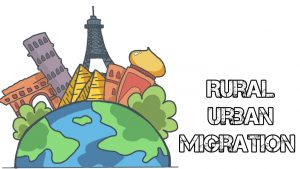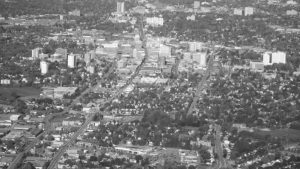Rural-urban Migration: effects and causes: The term “migration” is by no means a new concept. It has been practised from historic times in various parts of the globe and for various reasons. It forms a major part of human history and how many new grounds were found, colonised or taken over. The word “migrate” is derived from the Latin word “migratus” meaning to “change or transport”.
A simply definition of human migration will be the movement or change from one geographical area to another usually across a border. It involves both movement from a previous place where one lived (emigration) and moving into and residing in a new area (immigration).

Recommended: Causes, Effects and Solutions to brain drain in Nigeria
Types of Migration
There are various types of migration, some of which are:
a. Internal migration: migration within a recognised border. It could be within a state or country. This includes movement between zones or provinces located in the same country.
b. External migration: this implies movement across an internationally recognised border. This entails moving from one country to the other or one continent to another.
c. Rural-Urban migration: movement of people from a rural settlement to an urban area.
d. Urban-rural migration: movement of people from urban areas to rural areas.
e. Urban-Urban migration: movement of people from one urban area to another
f. Rural-rural migrations: this happens when inhabitants of a rural locality move to a more favourable rural area to live and work there.
Recommended: Signs to know an intelligent person
As earlier stated, rural-urban migration is the movement of people from rural dwellings to urban cities. It would be best, at this point, to distinguish properly between rural and urban areas. Rural areas, which some may refer to as “countryside”, are characterised by settlements of low population density and fewer infrastructures. Urban areas typically have a large population, a high population density and much social and economic infrastructure and amenities.
They can range from cities to metropolises. Rural-urban migration is a pattern seen in many countries, both developed and developing. However, the rates of such migrant movements differ, with generally higher rates seen in developing nations. Rural-urban migration therefore, is a major part of society and its causative factors as well as resulting effects need close attention.
Recommended: How to become a successful business entrepreneur
Causes of Rural-urban Migration
The details of the various reasons for migration vary. However, most reasons for rural-urban migration can be seen as a result of the interplay of two set of factors: the push factors and the pull factors. These two divisions form a basis of classifying the causes of migration.

The push factors refer to those conditions present in the rural sectors that encourage residents of such areas to leave. This implies that such conditions are unconducive, substandard or potentially dangerous when compared to such conditions seen in the urban settlements. These factors tend to drive people away from the rural settlements. Hence the term, “push factors”. They include but are not restricted to the following:
a. Economic push factors: these include poor standard of living, reduced or unavailable social amenities, decrease in availability of job opportunities amongst others. The above factors are more than likely to make residents unable to cope in such environments.

A decreased availability of basic amenities (like water, accommodation and good roads) and standard health care amenities (like hospitals and clinics) will surely lead to low quality of life. Generally, job opportunities in rural areas are scarce and job security is not certain.
Recommended: Advantages and Disadvantages of Judicial Precedence
b. Low standard of living: this is a result of the above factors. Put together, lack of good jobs, lack of basic amenities and lack of good educational facilities and personnel will surely result in a low standard of living.
c. Insecurities/ Wars: civil wars, civil unrests and high crime waves make people leave the rural areas for safer grounds. While one may argue that urban settlements are also plagued by this dangers, it is also true that security measures available in urban areas are by far better suited than those in the average rural areas.
d. Natural Disasters: these are occurrences beyond man’s control that endanger lives an properties. Floods, earthquakes, hurricanes and other such disasters, when they happen in rural settlements, will force residents to flee.
Also see: How to improve your emotional intelligence
e. Political factors: oppression by rulers or unstable government at the rural community level will reduce occupants’ willingness to remain in such places.
Conversely, the pull factors are those features of the urban settlements that attract potential immigrants from the rural settlement. These men, women and children are assured of a better quality of life based on these factors which include:
f. Economic factors: better standard of living, better job opportunities and quality amenities encourage movement into urban areas. Higher standard of education is a major factor for rural dwellers looking to further their education in better institutes of learning.
g. Political factors: cities have a defined system of government and selection of rulers. Such political stability is welcomed by those seeking to make such cities their new home.
h. Better security: people will always to prepare to live in a setting with law enforcement agencies and better record of security. This ensures safety of life and property.
Also see: Causes, Effects and Solutions to Conflict in Africa
Effects of Rural-urban migration
Rural urban migration has both positive and negative effects
Positive effects
a. Urbanization: with more people moving to the modern cities, there is increase in the available work force which will drive an increase in economic growth. This economic growth will drive the expansion of these cities, creation of more social amenities and health care facilities. Thus, increase in development.
b. Improved standard of living: the immigrants will enjoy a better standard of living in their new home. The will have a safer and more enabling environment.
c. Improved economic output: the economic status both those who migrated into the cities and the cities themselves benefit massively. This will encourage more economic growth and development.
Also see: Major reasons why women don’t participate in politics
Negative effects
a. Depletion of the rural economy: while the urban economy is profiting, the rural economy is on the losing end because the working population of these communities are migrating to the city. This will eventually affect the economy of the urban area because in many ways, resources of the urban areas are sourced from rural areas.
b. Increased population density: this is due to continued influx of people to the urban areas. These may lead to overcrowding and all its negative consequences like pollution, and high crime waves.
RECOMMENDED: Advantages and Disadvantages of buying from an online store
Recommendations:
a. Governments and non-government agencies to invest long term in the development of rural settlements. By establishing schools, roads, potable water supply.
b. Limits on populations of large cities should be placed, to avoid overcrowding.
In summary, rural urban migration, like with all other forms of migration, is of great civil, public health and social importance and must be seen as such for improvements to be made.

Edeh Samuel Chukwuemeka, ACMC, is a lawyer and a certified mediator/conciliator in Nigeria. He is also a developer with knowledge in various programming languages. Samuel is determined to leverage his skills in technology, SEO, and legal practice to revolutionize the legal profession worldwide by creating web and mobile applications that simplify legal research. Sam is also passionate about educating and providing valuable information to people.